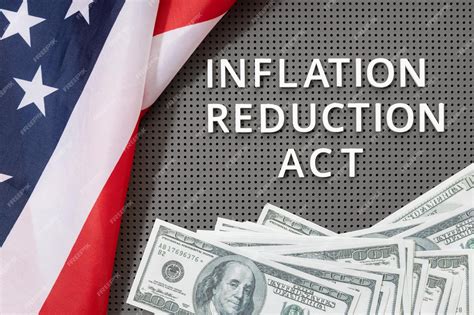Unlocking Savings: A Deep Dive into the Inflation Reduction Act Rebates
In an era marked by rising prices and economic unpredictability, the Inflation Reduction Act (IRA) emerged as a beacon of hope for many Americans. This transformative legislation not only aims to combat inflation but also provides numerous rebates designed to ease the financial burden on households. This article delves into the details of these rebates, exploring their significance, eligibility requirements, and the impact they have on both individuals and the broader economy.
Understanding the Inflation Reduction Act
Passed in 2022, the Inflation Reduction Act is a comprehensive piece of legislation aimed at addressing climate change, health care, and taxation issues. With a strong focus on clean energy investments and economic stability, one of its primary components is the rebate system that incentivizes energy efficiency and lowers energy costs for consumers.
The Significance of Rebates
Rebates under the IRA are designed to encourage American families to invest in energy-efficient technologies and home upgrades. By doing so, the act seeks to reduce greenhouse gas emissions while also helping households save on energy bills. The rebates not only benefit the environment but also bolster economic resilience by promoting energy independence.
Types of Rebates Available
Understanding the various rebates available is crucial for potential applicants. The Inflation Reduction Act offers several key rebate programs, including:
- Home Energy Rebate Program: This program offers rebates for upgrading home insulation, windows, heating systems, and other energy-efficient improvements. Homeowners can save significantly on installation costs through this initiative.
- Electric Vehicle (EV) Rebates: The IRA encourages the transition to electric vehicles by providing substantial rebates on new and used EV purchases. These rebates are designed to make electric vehicles more affordable for everyday consumers.
- Renewable Energy Tax Credit: Homeowners who install solar panels, wind turbines, or other renewable energy sources can benefit from tax credits that help offset the initial investment costs.
Eligibility Requirements
To access these rebates, certain eligibility criteria must be met. While specific requirements may vary by state and local jurisdiction, some common criteria include:
- Income Limits: Many rebate programs target low- to moderate-income households. Applicants may need to provide documentation of their income levels.
- Homeownership: Most rebates are available exclusively to homeowners who are making permanent improvements to their properties.
- Qualified Installers: Rebates often require that installations be performed by accredited contractors or installers to ensure compliance with safety and quality standards.
How to Apply for Rebates
The application process for rebates can be straightforward, but it can vary based on the programs and state regulations. Generally, the steps include:
- Research and identify which rebates you qualify for based on your energy improvements and income level.
- Select qualified products or services, ensuring they meet the criteria set forth by the IRA.
- Gather necessary documentation, including proof of installation and income verification.
- Submit your application through the appropriate state or local program.
It is important to stay informed about deadlines and ever-changing regulations to ensure that you maximize your savings.
Impact on Households and the Economy
The rebates provided under the Inflation Reduction Act are more than just financial incentives; they hold the potential to transform entire communities. By encouraging investments in energy efficiency and renewable energy, the IRA will:
- Reduce Energy Costs: Households can expect to see lower monthly utility bills, allowing them to allocate those funds elsewhere.
- Create Jobs: The push for energy-efficient upgrades and renewable energy installations is expected to generate employment opportunities across various sectors.
- Encourage Sustainable Practices: Increased access to clean energy solutions promotes a culture of sustainability and environmental responsibility.
Potential Challenges
While the Inflation Reduction Act offers numerous benefits, challenges exist. Some of these include:
- Awareness: Many consumers remain unaware of available rebates and how to apply for them. Increasing educational outreach is critical.
- Bureaucratic Hurdles: The application process can be daunting. Streamlining these processes will be essential to encourage participation.
Conclusion
The Inflation Reduction Act represents a pivotal shift in the way Americans can approach energy consumption and sustainability. Through its diverse rebate programs, the act not only alleviates financial stress on households but also fosters a greener economy. As consumers become more aware of these resources, the potential for widespread adoption of energy-efficient technologies could lead to significant economic and environmental benefits.
FAQs
1. What types of rebates are available under the Inflation Reduction Act?
The IRA offers home energy rebates, electric vehicle rebates, and renewable energy tax credits, among others, to incentivize energy-efficient improvements and purchases.
2. Are there income limits for eligibility?
Yes, many rebate programs are designed for low- to moderate-income households and may have specific income threshold requirements.
3. How do I apply for rebates?
The application process typically involves identifying eligible rebates, selecting qualified products, gathering documentation, and submitting your application through local or state programs.
4. Can renters benefit from these rebates?
Most rebates are aimed at homeowners. However, some programs may allow for landlord-tenant arrangements where improvements can be made benefiting both parties.
5. How do these rebates impact the economy?
In addition to helping households save money, the rebates can create jobs in the energy efficiency and renewable energy sectors while promoting sustainable practices.
Download Inflation Reduction Act Rebates
